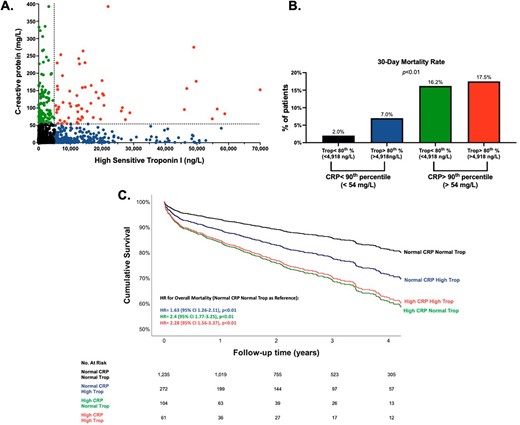-
PDF
- Split View
-
Views
-
Cite
Cite
R Y Brzezinski, Y Shacham, S Banai, M Katz Shalhav, O Rogowski, I Shapira, D Zeltser, S Shenhar-Tsarfaty, S Berliner, M Mizrahi, The CRP Troponin Test (CTT) stratifies mortality risk in patients with Non-ST Elevation Myocardial Infarction (NSTEMI), European Heart Journal, Volume 44, Issue Supplement_2, November 2023, ehad655.1531, https://doi.org/10.1093/eurheartj/ehad655.1531
Close - Share Icon Share
Abstract
The CRP-Troponin test (CTT) comprises serial measurements of both CRP and cardiac troponin and might reflect the systemic inflammatory response in patients with acute coronary syndrome. Here, we sought to test the ability of the CTT to stratify the short and long-term mortality risk in patients with non-ST elevation myocardial infarction (NSTEMI).
We examined 1,675 patients who were diagnosed with NSTEMI on discharge and had at least two successive measurements of combined CRP and cardiac troponin (up to 6 h apart), all within the first 48 hours of admission. We used a tree classifier model to determine which measurements and cutoffs could be used to best predict mortality during a median follow-up period of 3 years [IQR 1.8–4.3] (Figure 1A).
Patients with high CRP levels (above 90th percentile, >54 mg/L) had a higher 30-day mortality rate regardless of their troponin test status (Figure 1B). However, among patients with "normal" CRP levels (<54 mg/L), those who had high troponin levels (above the 80th percentile, 4,918 ng/L) had a higher 30-day mortality rate compared with patients with normal CRP and troponin concentrations; 7% vs. 2%, p<0.01 (Figure 1B). A multivariate cox regression analysis showed that the CTT test result was an independent predictor for overall mortality even after adjusting for age, sex, and existing co-morbidities (Figure 1C).

Author notes
Funding Acknowledgements: None.
- acute coronary syndromes
- anti-inflammatory agents
- myocardial infarction
- troponin
- non-st elevated myocardial infarction
- inflammation
- follow-up
- trees (plant)
- morbidity
- mortality
- clinical diagnostic instrument
- inflammatory response
- cox proportional hazards models
- laboratory test finding
- cardiac troponin measurement
- c-reactive protein, increased



